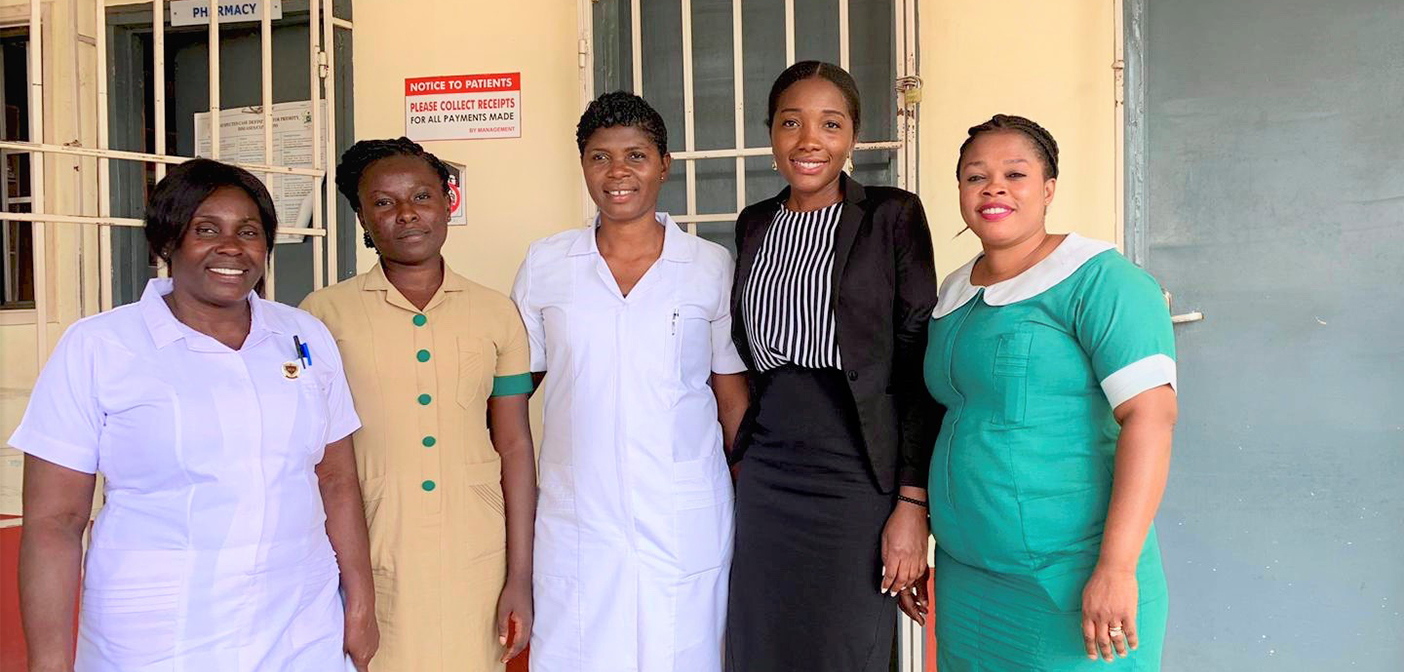The answer is out there, somewhere—perhaps in Ghana, where researcher Yvonne Commodore-Mensah seeks a different, translatable care model
By Steve St. Angelo
Yvonne Commodore-Mensah had been working on several puzzles simultaneously. The first was the intimidating pile of forms on her office table to be completed before the fiscal year’s end. (The life of a researcher.)
And then there was the itinerary for a looming trip to her home country of Ghana to further her work on cardiovascular disease among African migrants and its corresponding impact in the United States. (The journey was to include a too-brief stop in the capital city Accra to see family.)
There was the just-finished master’s degree in health sciences—“a more practice-oriented degree”—from the Bloomberg School of Public Health to join her PhD from the School of Nursing, where she is an assistant professor. “Trying to juggle that, and faculty responsibilities, and recruiting subjects for research … it was interesting,” she admits. “Definitely, the pain was worth the gain.”
And all of it fascinates Commodore-Mensah, especially the puzzle of cardiovascular disease.
“Globally I’m interested in the effect of migration on health”—both rural to urban and nation to nation, she says, but also the effects of globalization on those who stay put when the world and, say, KFC arrive at their door. For instance, automotive transportation is no doubt an advance for a nation in which walking great distances has long been the main way one got to here from there. All of those daily steps meant that gym-based exercise never became the thing it is in the U.S. Alas, fast-food consumption threatens to, with KFC and others setting up shop. “We are seeing those effects on people’s diets,” Commodore-Mensah explains.
The health of African immigrants to the U.S. has been shown to suffer as well, but it’s not as simple as: Ghanaian moves to America; eats like an American; gets obese; gets heart disease.
“In many parts of Ghana, people only go to the hospital when they are really sick or dying”
Health care disparities between rich and poor are as entrenched in Ghana as in much of the U.S. And thus African immigrants new to American health care are far less likely to have experienced—or to seek out—the routine, preventive medical services we often take for granted. “In many parts of Ghana, people only go to the hospital when they are really sick or dying,” explains Commodore-Mensah, a fellow of the American Heart Association.
In an encouraging twist, the longer an immigrant remains in the U.S., research suggests, the more likely it is that health care access and outcomes can improve. And, “If you live in a community where people go jogging all the time and maybe eat salads—things that people don’t consider ‘African’—you can see lifestyle changes than can also improve health.”
Back in Ghana, the health fallout could threaten the sustainability of economic growth as well as that of similar nations. “We need to address the issue at the source,” Commodore-Mensah insists, in this case Kumasi, an urban setting in southern Ghana. Then, “If we can understand these burdens of risk factors, it makes us better prepared to receive these populations when they migrate to the U.S.”
Commodore-Mensah applied for a Johns Hopkins Alliance for a Healthier World grant after helping to build the interdisciplinary research team that the funding requires. “It’s a collaboration between the School of Nursing, School of Public Health, School of Medicine, and there’s even an investigator from the Krieger School of Arts & Sciences who’s an anthropologist—that’s the beauty of this grant,” says Commodore-Mensah. A co-investigator in Ghana is a respected neurologist.
“Together, we’ve designed a clinical trial to see if we can propose a paradigm shift in how we manage high blood pressure”
“Together, we’ve designed a clinical trial to see if we can propose a paradigm shift in how we manage high blood pressure,” traditionally the role of the physician in sub-Saharan nations. There, a physician shortage on top of a lack of resources presents a big problem but a great opportunity. “Our thinking is using community health nurses [supported with a mobile health platform called Empower Health developed by Medtronic Labs] to manage a lot of these health conditions. Can we train these nurses to effectively improve blood pressure control?”
Watch this space and your favorite cardiovascular health journal for updates on that. If it does work, maybe the health care model can be scaled up and brought home.
Cardiovascular disease disproportionately affects U.S. populations of African descent, she explains. “In the U.S., we know that 100 million people have high blood pressure,” says Commodore-Mensah. “We know that blacks are more likely to have risk factors such as high blood pressure and diabetes and suffer complications from those conditions, including early death.”
“And we’re not doing any better with reducing the burden. So for a condition that is so prevalent, is it possible for us to learn from other, low-resource settings in terms of models for improving health?”
“Global health research is difficult, it’s time-consuming, but there’s also an opportunity to learn from different settings, maybe different approaches to using resources effectively.”
